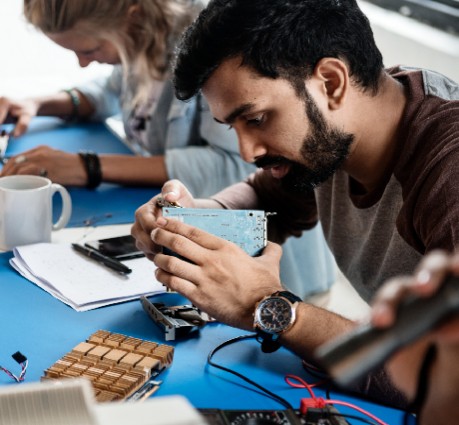Engineering is the creative application of science, mathematical methods, and empirical evidence to the innovation, design, construction, and maintenance of structures, machines, materials, devices, systems, processes, and organizations. The discipline of engineering encompasses a broad range of more specialized fields of engineering, each with a more specific emphasis on particular areas of applied mathematics, applied science, and types of application. Dr. C. V. Raman Institute of Science & Technology is one of the leading faculties of Dr. C. V. Raman University. Engineering and Technology is a broad set of disciplines that deal with everything connected to the design, manufacture, and maintenance of infrastructure, devices, tools, and information systems used by people on a daily basis.
Duration of Program
Level of Study

Material properties analysis for engineering material selection
Heat conductors and temperature scale identification
Sound intensity variation analysis and physical properties
Prepare a list of dos and don’ts applicable during disasters.
PO1 : The ability to apply science, engineering science, and mathematics to solve engineering problems.
PO2 : The ability to put their engineering and design skills into practice
PO3 : The ability to use industrial-quality laboratory equipment and engineering software for analysis, testing, design, and communication.
PO4 : The ability to design systems, components, and processes that satisfy predetermined constraints.
PO5 : The ability to put engineering problems, put them in solvable form, and develops and evaluates alternative solutions.
PO6 : The ability to communicate their ideas and designs clearly orally, in written form, and graphically.
PO7 : To produce ethical, motivated and skilled engineers through theoretical knowledge and practical applications.
PO8 : The ability to work as members of a team.
PO9 : Had the opportunity to develop leadership skills
PSO1 : Able to apply knowledge of mathematics, science, and in different streams of Engineering.
PSO2 : Able to demonstrate skills to use modern engineering tools and software to analyze technical problems.
PSO3 : Able to identify, formulate and solve engineering problems related to Information Technology.
PSO4 : Able to develop logic and programming skills through immersion in the fundamental programming.
PSO5 : Able to demonstrate knowledge of professional and ethical responsibilities.
PSO6 : Able to demonstrate effective communication skills of computer subjects, in both oral and written forms.
PSO7 : Able to demonstrated leadership and capability to participate in teamwork in an environment with different disciplines of engineering, science and business.
PSO8 : Able to develop confidence for self-education, teamwork and ability for lifelong learning.
PSO9 : Able to use the techniques, skills, and modern engineering tools necessary for engineering practice
PEO1 : Engineering knowledge: Apply the knowledge of mathematics, science, engineering fundamentals, and an engineering specialization to the solution of complex engineering problems.
PEO2 : Problem analysis: Identify, formulate, review research literature, and analyze complex engineering problems reaching substantiated conclusions using first principles of mathematics, natural sciences, and engineering sciences
PEO3 : Design/development of solutions: Design solutions for complex engineering problems and design system components or processes that meet the specified needs with appropriate consideration for the public health and safety, and the cultural, societal, and environmental considerations
PEO4 : Project management and finance: Demonstrate knowledge and understanding of the engineering and management principles and apply these to one’s own work, as a member and leader in a team, to manage projects and in multidisciplinary environments